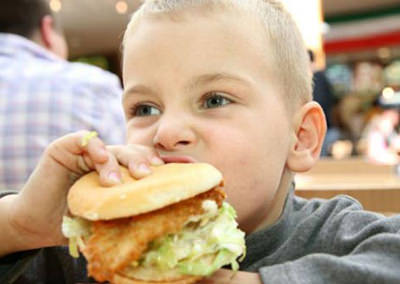A new study suggests fast food consumption is not the major cause of the recent spike in childhood obesity.
Researchers looked at the daily diets of more than 4,000 children.
They found fast food consumption was only a small part of a much larger unhealthy diet problem.
Researchers say a lot of children are eating too many processed foods and sugary beverages and not enough fruits and vegetables both at home and at school.
The study examined data acquired through the National Health and Nutrition Examination Survey (NHANES) between 2007 and 2010.
Dietary intake, including whether foods and beverages were obtained in fast-food establishments or elsewhere, was evaluated in 4,466 children who were 2 years to 18 years of age.
They were further categorised as being nonconsumers of fast food (50 per cent of the children), low consumers (less than or equal to 30 per cent of calories from fast foods; 40 per cent of the children), or high consumers (more than 30 per cent of calories from fast foods; 10 per cent of the children).
The researchers then determined which factors were most related to dietary adequacy and risk for obesity.
“The study presented strong evidence that the children’s diet beyond fast-food consumption is more strongly linked to poor nutrition and obesity,” said Jennifer Poti, doctoral candidate in UNC’s Department of Nutrition and co-author of the study.
“While reducing fast-food intake is important, the rest of a child’s diet should not be overlooked,” Poti said.
“Children who rely on fast foods may tend to have parents who do not have the means, desire or time to purchase or prepare healthy foods at home,” Popkin said.
“This is really what is driving children’s obesity and what needs to be addressed in any solution,” Popkin said.
The study was published in The American Journal of Clinical Nutrition.
Agencies/Canadajournal
 Canada Journal – News of the World Articles and videos to bring you the biggest Canadian news stories from across the country every day
Canada Journal – News of the World Articles and videos to bring you the biggest Canadian news stories from across the country every day



